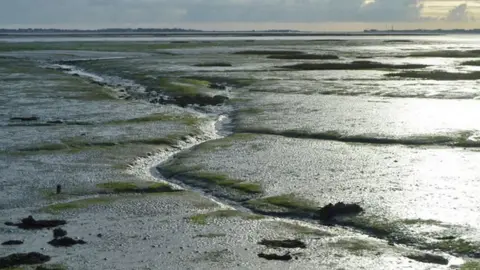Warning over Langstone Harbour shrimps' low sperm count
 Robin Webster
Robin WebsterWater pollution could be causing infertility among shrimp-like creatures off the south coast of England, scientists have found.
A University of Portsmouth study found they had 70% less sperm than those in less polluted locations.
The research was carried out in Langstone Harbour near Portsmouth over the past 10 years.
Prof Alex Ford said shrimps were "the canary in the mine", highlighting male infertility in other creatures.
A decade ago little shrimp with very low sperm counts were observed in the Langstone Harbour Site of Special Scientific Interest.
'Population collapse'
The scientists continued to monitor the shrimps, many of whom were in untreated water as the area is susceptible to storm water surges.
The findings, published in Aquatic Toxicology, show they could be exposed to contaminants from sewage, old landfill sites and chemicals such as those in anti-fouling paints.
Prof Ford said: "It is thought that some male fertility problems are related to pollution.
"It may not be the same pollutants, but it is all chemicals that are being released into the environment. It is not being stopped and, more importantly, the effects are not being properly monitored or understood."
The research also showed that female shrimp produce fewer numbers of eggs, suggesting that because male shrimps' capacity to fertilise females is compromised, the females in turn have fewer eggs.
The team raised concerns that this could lead to a population collapse in the area, which would have a knock-on effect on birds and fish higher up the food chain.

Follow BBC South on Facebook, Twitter, or Instagram. Send your story ideas to [email protected].
